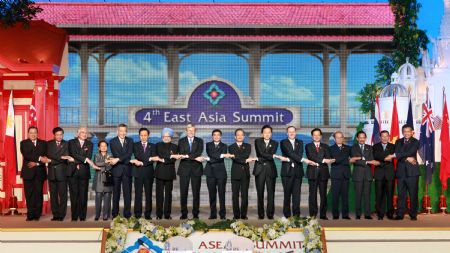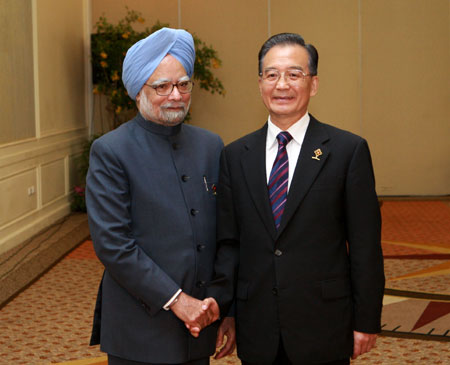Wen's attendance at ASEAN-related meetings of great significance
He proposed that taking the ASEAN+1 mechanism as the basis, and ASEAN+3 mechanism as the major channel, the countries in the region draw on each other's strengths and help each other further develop and move toward the long-term goal of establishing an East Asian community.
Yang said the regional economy had shown positive signs of recovery, but there was still a long way to go to realize relatively rapid economic growth.
Wen said tackling the global financial crisis is still the top priority for countries in the region, and East Asian countries should remain firm in their resolve to tackle the crisis, and their relevant policies should remain unchanged, and efforts not to be weakened.
Meanwhile, the countries in the region should be ready for a long-term battle against the crisis and should not give up easily, Wen said.
He also proposed that these countries try to facilitate trade and investment, expand trade and investment within the region and urged them to keep abreast with the latest global industrial revolution, and enhance cooperation in green economy, recycling economy, modern agriculture and manufacturing industry.
Wen said he hoped the Chiang Mai Initiative Multilateralization(CMIM), a 120-billion-dollar regional reserve pool aimed at providing emergency liquidity for countries in financial crisis, could be launched by the end of this year.
He pledged 200 million dollars to the region's credit guarantee and investment fund.
Countries in the region should also step up efforts to develop the Asian bond market and establish regional economic surveillance organizations, in a bid to enhance their ability to prevent and manage risks in the region, he said.
Yang said infrastructure construction was both the bottleneck of regional development and a new economic growth point.
Wen proposed that countries make use of their cutting edge in capital, technology and labor to make better planning and coordination and set up easily accessible and highly-efficient infrastructure networks in the region, and provide strong support for East Asian integration.
Leaders at the summit gave a positive response to Wen's proposals and spoke highly of China's important role in pushing forward cooperation in the region. They expressed readiness to join hands to usher in an even greater future of regional cooperation in East Asia, Yang noted.
Enhancing bilateral ties with neighboring countries
Yang said that during the meeting, Premier Wen has held a series of bilateral meetings, and reached many significant consensuses.
While meeting with his Indian counterpart Manmohan Singh, the two premiers agreed to push forward the strategic cooperative partnership between the two countries. They agreed that the two countries should welcome each other's development rather than consider each other as a threat, Yang said.
The two countries pledged to adhere to good-neighboring relations, maintain high-level interactions, enhancing mutual political trust and expand cooperation of mutual benefit. They will also strengthen coordination in tackling the pressing issues such as the global financial crisis and the climate change.
 0
0 









Comments